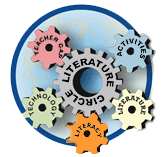One of the first comprehensive lists of multiples was put together by William Ogburn and Dorothy Thomas, in 1922, and they found a hundred and forty-eight major scientific discoveries that fit the multiple pattern. Newton and Leibniz both discovered calculus. Charles Darwin and Alfred Russel Wallace both discovered evolution. Three mathematicians “invented” decimal fractions. Oxygen was discovered by Joseph Priestley, in Wiltshire, in 1774, and by Carl Wilhelm Scheele, in Uppsala, a year earlier. Color photography was invented at the same time by Charles Cros and by Louis Ducos du Hauron, in France. Logarithms were invented by John Napier and Henry Briggs in Britain, and by Joost Bürgi in Switzerland.This may be the same with Literature Circles. I say this because I was doing this in my classroom long before I heard of Harvey Daniels. For me it was using short stories. For another teacher it was poetry. I know other teachers also did this as they confirmed this fact with me at conferences.
“There were four independent discoveries of sunspots, all in 1611; namely, by Galileo in Italy, Scheiner in Germany, Fabricius in Holland and Harriott in England,” Ogburn and Thomas note, and they continue:
The law of the conservation of energy, so significant in science and philosophy, was formulated four times independently in 1847, by Joule, Thomson, Colding and Helmholz. They had been anticipated by Robert Mayer in 1842. There seem to have been at least six different inventors of the thermometer and no less than nine claimants of the invention of the telescope. Typewriting machines were invented simultaneously in England and in America by several individuals in these countries. The steamboat is claimed as the “exclusive” discovery of Fulton, Jouffroy, Rumsey, Stevens and Symmington.

Harvey Daniels has always done an entertaining presentation at the annual NCTE Fall Conference at the Middle Mosaic session. He wrote a book on a pretty simple idea, Literature Circles. Let kids choose their own book to read. He called it Literature Circles. Well, the concept is simple. The scholars choose a book from a list of books provided by the teacher. Scholars who have chosen the same book get together in the same group and discuss it according to protocols. Simple enough and probably done by many teachers before the book was conceived.
Teachers are so easily turned on, I know I am. When I walk around the class during Lit circles, I too get goose bumps as I hear my scholars talk about books. In the groups the roles are named alliteratively: Artful artist, Literary luminary, Discussion director, Capable connector, Word wizard. The Word Wizard collects vocabulary words that are new,unique, or important. The Artful artist is preparing the look of the presentation. The Literary Luminary is gathering selections to share. The Capable Connector is finding ways to connect the text to self. Running a Literature Circle has each member perform certain tasks as directed by their role. Essentially it is a method for teachers to get the scholars excited about literature and to use groups.

Literature Circles are another example of moving to being "the guide by the side, not the sage on the stage." In many classes the teacher directs the class by asking the class questions and the scholars respond or the teacher lectures. However, many of us found this disingenuous and made for a poor learning environment. We wanted our scholars engaged. We wanted them to be more responsible for their learning. Group work was a way to go and Literature Circles was a good format.
For many teachers, Literature Circles are the answer to the question I had had when I started teaching in a large class of 32 students. As new teachers enter the profession they have a useful tool available to them in Literature Circles. Though they are temporary, because the scholars select a different text each time, they are useful and lead to other ways to use groups in their classes. Providing some kind of template to the process is useful. Certainly, when we teach the same play, short story, novel in class; group work is very useful and each group has different projects about the same piece of literature. Portfolios, webfolios, and other presentations are the end product of Literature Circles.









0 comments:
Post a Comment